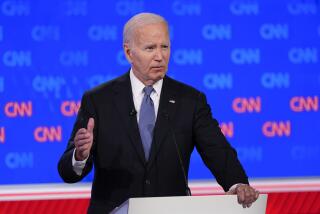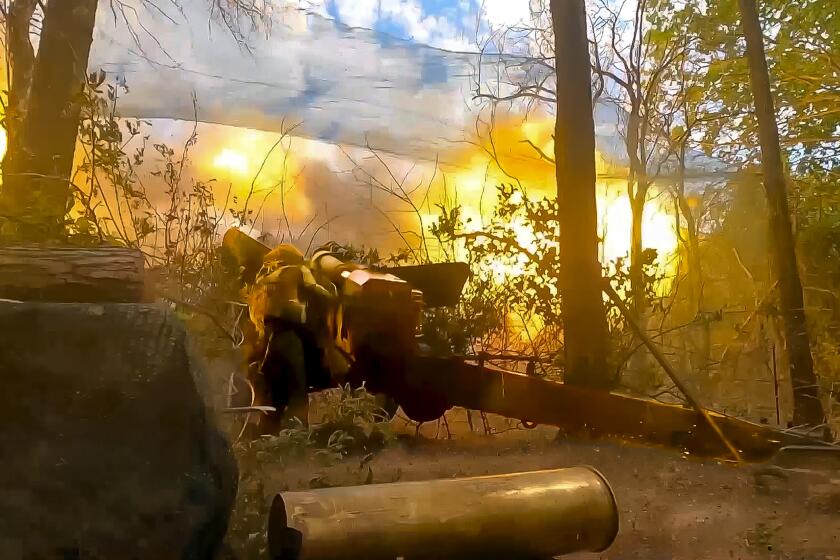MILITARY : NATO After the Cold War: It’s ‘Out of Area or Out of Business’
Since the Cold War ended and the Soviet Union ceased to be a vital threat to Western Europe, the North Atlantic Treaty Organization has searched for a meaningful new role.
Increasingly, NATO officials worry that the Atlantic Alliance--one of the most successful military defense structures in modern history--might become irrelevant.
These officials fear that, without a Soviet challenge, it is difficult to justify to heavily taxed electorates the high price of maintaining expensive armed forces. So they now argue that NATO forces must be able to be deployed “out of area”--that is, beyond the boundaries of the 16-nation area that the alliance was created to defend 44 years ago.
Recently, a RAND Corp. analysis on the alliance’s future has also concluded that NATO must, to survive, engage in peacekeeping operations beyond its borders--summarizing in the new buzz phrase: “Out of area or out of business.”
In the last few months, most senior NATO political and military officials agreed that the alliance was ideally suited, with its tight-knit, experienced command structure, to carry out peacekeeping or other operations beyond its borders.
NATO Secretary General Manfred Woerner pointed out that the successful, U.S.-led fighting of the Persian Gulf War was partly the result of the close relationship among American, British and French military forces in NATO. “As was demonstrated during the Gulf War through NATO’s indirect support,” he observed, the alliance “remains the backbone of the West’s ability to deal collectively with the multiplying threats and instabilities of this new era.”
That concept sounded fine--until NATO encountered the mire of the Balkans, where it has formally deployed forces for the first time outside Western Europe.
The former Yugoslav federation and particularly Bosnia-Herzegovina “illustrate the difficulty NATO has when operating in uncharted regions,” says one senior diplomat here. “NATO has traditionally made decisions based on consensus. But in Bosnia there is no consensus among ourselves.”
The problem in Bosnia is that the NATO nations have their own agendas.
Four NATO nations--Britain, France, Spain and Canada--have sent peacekeepers to the Balkans for a humanitarian role in assisting relief supply convoys.
But the United States--which won’t send ground troops, even to protect food convoys--is more inclined under the Clinton Administration to use air strikes to lift the siege of Sarajevo and other Muslim enclaves.
The U.S. air-strike policy is tougher than the stance taken by NATO countries with soldiers on the ground. These NATO members fear that, at best, their humanitarian effort would end with U.S.-led air strikes; at worst, their soldiers may be drawn into the conflict.
Further, Germany, a major force in NATO, will not send ground troops to Bosnia because its political leaders argue that this conflicts with the nation’s postwar constitution. Germany also is loath to get involved because its troops invaded Yugoslavia in World War II, a fact that still roils Balkan politics.
As for NATO members Greece and Turkey--one Orthodox Christian, the other Muslim--they are reluctant to provide forces, worrying about the difficulties inherent in maintaining their forces’ neutrality as peacekeepers.
“It’s a pity that former Yugoslavia has become a test case for NATO,” said one diplomat at the Brussels headquarters. “It’s a peacekeeping test case from hell.”
Col. Andrew Duncan, of the International Institute for Strategic Studies in London, said: “The trouble is that the Balkans have so many special aspects, with half of NATO unable to take common positions. It is sad because NATO has the military forces, it has the command structure with officers who have worked together for years and the skills to deploy high-tech military units.”
NATO specialists believe that to justify the alliance’s existence, it must be available to the United Nations or other international organizations for peacekeeping work. “I think what might happen,” Duncan said, “is that NATO would no longer need unanimous consensus to get involved. . . . When the U.N. asks NATO’s assistance, one or more members could opt out on a case-by-case basis.”
A senior NATO representative said: “NATO must be active in future peacekeeping operations, out of area, however complicated--because we alone have the capability. Otherwise it is fair to ask: What is NATO for?”
More to Read
Start your day right
Sign up for Essential California for news, features and recommendations from the L.A. Times and beyond in your inbox six days a week.
You may occasionally receive promotional content from the Los Angeles Times.






